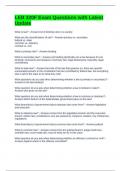Exam (elaborations)
LEB 320F Exam Questions with Latest Update
- Course
- Institution
What is law? - Answer-list of binding rules in a society What are the classifications of law? - Answer-primary vs. secondary federal vs. state common vs. statutory criminal vs. civil What is primary law? - Answer-binding What is secondary law? - Answer-not binding (techically not a law ...
[Show more]



